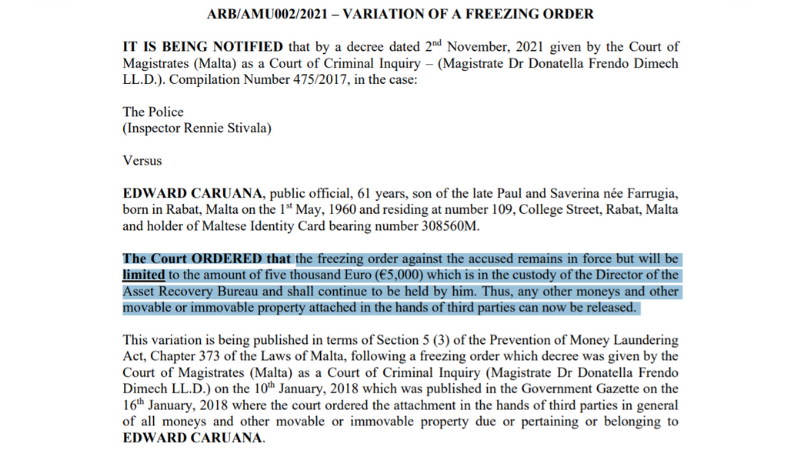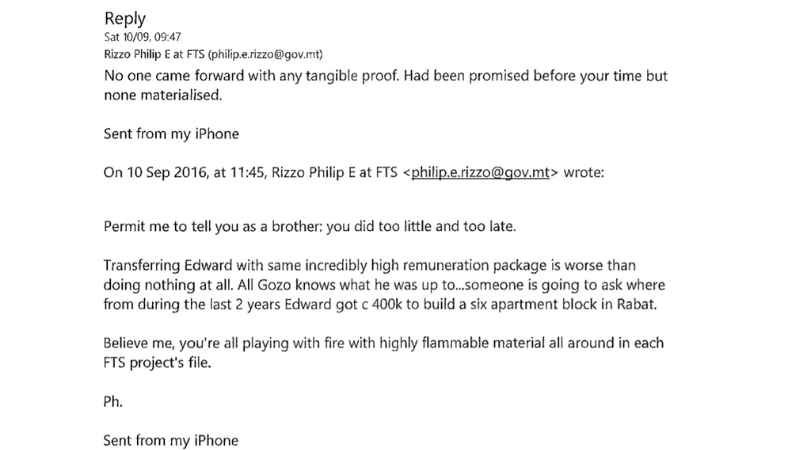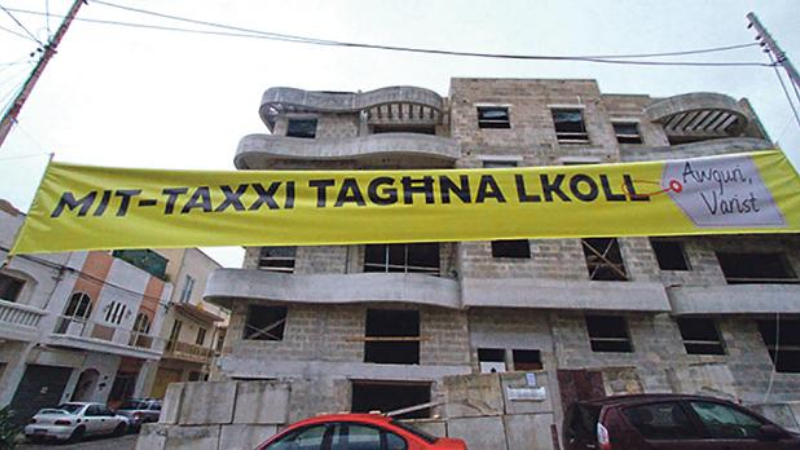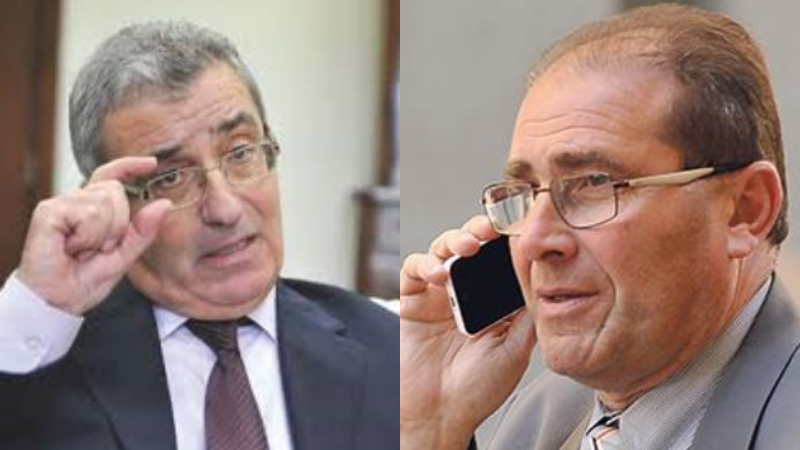In a rare and ‘surprising’ decision, Magistrate Donatella Frendo Dimech has decreed that all movable and immovable assets belonging to Edward Caruana – the 61-year-old former chief canvasser of Minister Evarist Bartolo facing charges of corruption and embezzlement of public funds – are to be released, bar the token sum of €5,000.
The controversial decision by the magistrate was made a few weeks ago, although the case against Caruana is still ongoing, The Shift has learned.
In her decree, Magistrate Frendo Dimech ordered that “the freezing order against the accused remains in force but will be limited to the amount of five thousand Euro (€5,000) which is in the custody of the Director of the Asset Recovery Bureau and shall continue to be held by him. Thus, any other moneys and other movable or immovable property attached in the hands of third parties can now be released.”
Court sources told The Shift that this effectively means that a block of apartments in Rabat built by Caruana with ‘dubious’ funds during the period in which he’s accused of committing corruption and embezzlement of public funds, has now been released and can be disposed of as Minister Bartolo’s former chief canvasser deems fit.

Court order releasing the asset freeze on Evarist Bartolo’s canvasser’s assets
The sources said that this will also mean that in the eventuality that Caruana is found guilty of embezzlement or corruption, the court will not be able to order the return any of any ‘stolen’ funds, except for €5,000 euros.
Court sources told The Shift that this ‘strange’ decision is based on the fact that the prosecution has now produced all its witnesses and has, somehow, not managed to prove any connection between the charges and Caruana’s possessions, including the infamous Rabat block of apartments.
Still, the sources confirmed that it is very ‘rare’ that such a freezing order is released prior to the conclusion of such a high-profile case.
Who is Edward Caruana?
Edward Caruana, before his arraignment in 2017, had been seen as Minister Evarist Bartolo’s chief canvasser on the Rabat district since 1992.
He spent some of his working life on the public payroll as Bartolo’s driver and as part of his private secretariat, together with his brother Joseph, who was promoted to permanent secretary in Bartolo’s then education ministry in 2013.
Following Labour’s return to power, Edward Caruana was appointed a manager at the Foundation for Tomorrow Schools (FTS) – responsible for multi-million-euro school projects – in a position created for him by the ministry.
Caruana immediately took over the ‘management’ of large school projects, serving as a liaison officer between Evarist Bartolo’s ministry and major contractors involved in the projects.
Caruana was first accused of wrongdoing by then FTS CEO Philip Rizzo – then another of Bartolo’s ‘persons of trust’ – who reported him to the police for taking bribes and demanding kickbacks from contractors procured on school government projects.
Among other accusations, which Rizzo insists were reported to both Minister Bartolo and even then Prime Minister Joseph Muscat, Rizzo said Caruana used to distribute government payments to contractors personally, which goes against all procurement rules.

E-mail correspondence between then FTS CEO Philip Rizzo and Minister Bartolo questioning the canvasser’s source of funding
According to documents presented to the police, Caruana had distributed some €8 million worth of government payments to contractors.
He also allegedly solicited cuts and ‘favours’ in kind, such as “a truckload of tiles” from one of the contractors.
Caruana was only arraigned in court in December 2017, some 18 months after the first allegations were published. Instead of resigning or being sacked, Caruana ‘self suspended’ himself on full pay until his arraignment, with the permission of the current head of the public service, Mario Cutajar.
A costly private project undertaken with no bank loan
While Caruana was allegedly asking for bribes and kickbacks, it was established that during the same period he was engaged in a private personal project – the building of a large apartment block in Rabat consisting of office space, flats and penthouses.
Red flags were raised when it became clear that Caruana, who had always been a government employee, had not taken out a loan to realise this project, which according to Philip Rizzo must have cost at least €400,000. At today’s market prices, the completed block is worth some €2 million.

In the lead up to the last general elections, the PN had drawn attention to Edward Caruana’s block of apartments in Rabat.
During the same period that Caruana was building his private project, the government, under Caruana’s watch, was also constructing a new multi-million school in Dingli, a few minutes away from Caruana’s apartment block.
In his accusations, Rizzo said he told Evarist Bartolo, point-blank, that he was playing with fire. “Someone is going to ask where from during the last 2 years Edward (Caruana) got circa €400,000 to build a six-apartment block in Rabat,” Rizzo told Bartolo in an e-mail.
Evarist Bartolo refused to accept responsibility for his person of trust, even after Caruana had been arraigned in court, insisting that he had not defended his canvasser and had urged Rizzo to take the case to the police.
On his part, Rizzo insisted that Bartolo resisted taking action against his canvasser and had “spent months trying to convince him not to report the case”.
Edward Caruana’s case is still ongoing through the court’s asset freeze order has now been dropped.
In 2018, Magistrate Frendo Dimech had already given Caruana permission to sell some of his flats, as long as the proceeds remained frozen.
Now, after her last decree, Caruana is free to dispose of and access the proceeds of the dubious and highly controversial investment.













Par for the course in today’s Malta.
X’VILTA’. SKANDLU FUQ IEHOR.
Whilst we’re compelled (under arrogant threats of astronomical fines) to continue wasting time compiling & maintaining senseless bibles of FIAU reports and risk assessments – “enterprising” chaps are allowed to reallocate “their wealth” beyond the belated reach of the Asset Recovery Bureau.
The law in the hands of criminals…..no more need be said.
Court of Jesters!
Malli ha l-poter ta’ Ministru , Varist nesa lil min kien ikun ta spalla ghalih fi zmien it-tmexxija tal-Gvern Nazzjonalista
X’ser jiktbilna Evarist issa fuq dan il-kas.